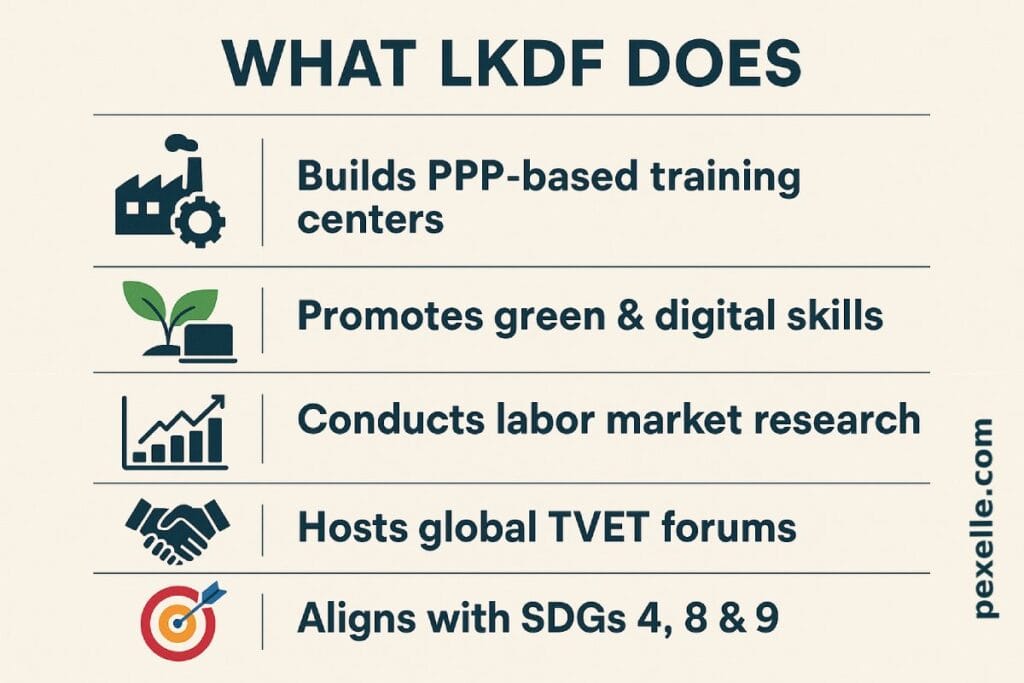What is LKDF and What Are Its Roles?

Introduction
The Learning and Knowledge Development Facility (LKDF) is a global initiative spearheaded by the United Nations Industrial Development Organization (UNIDO) in collaboration with various development partners. Founded with a vision to foster inclusive and sustainable industrial development, LKDF plays a critical role in bridging the gap between labor market demands and technical vocational education and training (TVET) systems. In an era of rapid technological change and shifting labor dynamics, the LKDF emerges as a key player in empowering youth, promoting public-private partnerships (PPPs), and driving industrial transformation.
Purpose and Vision
The core mission of the LKDF is to support the establishment and modernization of industrial training academies in developing countries. These academies are designed to equip youth and vulnerable populations with demand-driven skills aligned with the future of work. LKDF envisions a world where skills development is inclusive, relevant, and responsive to the evolving needs of industry and society.
Through its focus on sustainable development, LKDF aligns with the UN Sustainable Development Goals (SDGs), especially Goal 4 (Quality Education), Goal 8 (Decent Work and Economic Growth), and Goal 9 (Industry, Innovation, and Infrastructure).
Strategic Functions and Activities
LKDF functions as more than just a training facilitator—it is a platform for collaboration, innovation, and systemic change. Its main roles include:
- 🔧 Establishing PPP-based training centers: By engaging the private sector, governments, and civil society, LKDF ensures that vocational education is tailored to market needs.
- 📊 Conducting research and knowledge sharing: LKDF produces studies and analytical tools to assess skills gaps, future labor market trends, and training impact.
- 🤝 Facilitating global dialogue: Through its annual LKDF Forum, the organization brings together stakeholders from across the globe to discuss policies, innovations, and challenges in TVET.
- 🌱 Promoting green and digital skills: LKDF supports the integration of environmental sustainability and digital literacy into technical education frameworks.
These activities allow LKDF to act as a catalyst for long-term workforce development, fostering inclusive economic growth and social stability.
Impact and Partnerships
One of LKDF’s most important contributions is its ability to forge strategic partnerships. It collaborates with multinational companies, national ministries, donor agencies, and UN entities to develop and scale TVET programs in Africa, Latin America, the Middle East, and Asia.
Projects supported by LKDF have led to:
- The creation of vocational academies in sectors such as automotive, agriculture, and renewable energy.
- Increased employment opportunities for marginalized groups, including women and youth.
- Strengthened industrial ecosystems through skilled labor pipelines.
These partnerships are often formalized under the PPP4Youth model, which ensures sustainable financing and governance of training initiatives.
Conclusion
In a world facing unemployment, automation, and environmental challenges, the Learning and Knowledge Development Facility offers a scalable and inclusive solution. By linking industry, government, and education sectors, LKDF not only enhances individual livelihoods but also contributes to broader economic resilience and sustainability.
Its impact is clear: when skills match market needs, everyone benefits—industries thrive, communities grow, and nations move forward.
Source : Medium.com




